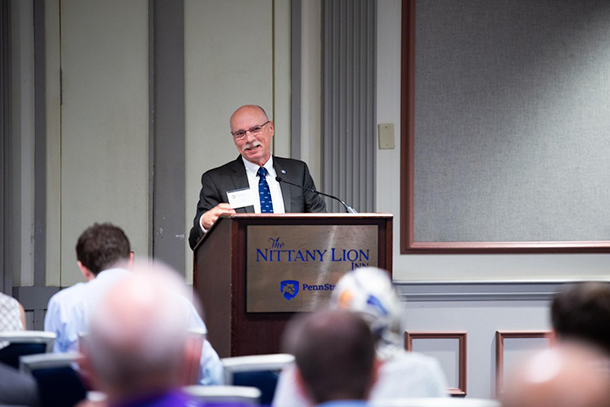
Neil Sharkey, Penn State's vice president for research, welcomes members of industry, faculty and students to the third annual industryXchange event.
Penn State 'sensing' the future of collaboration in 2019 industryXchange
06/05/19
By Ashley WennersHerron
UNIVERSITY PARK, Pa. – The Penn State College of Engineering welcomed representatives from 47 companies, six government agencies, seven Penn State campuses and ten colleges at University Park, to its third annual industryXchange at the Nittany Lion Inn on May 30.
This year’s theme of “sensors” brought together experts from fundamental research, development, applied use and policy to discuss potential cross-collaboration to advance the capabilities and uses of sensors. The event kicked off with welcome remarks by Neil Sharkey, the vice president for research at Penn State, and Justin Schwartz, the Harold and Inge Marcus Dean of Engineering.
“Our goal is to facilitate connections between our faculty and members of industry and government. Ultimately, we’ll need collaborations across all fronts to advance the technology that will solve real-world problems facing society,” said Priya Baboo, director of industry, innovation and development in the College of Engineering, and organizer of industryXchange.
This is particularly important, according to Schwartz, when it comes to the myriad research and applications related to sensors.
“IndustryXchange sparked out of the College of Engineering as an idea to investigate how to exchange ideas with industry, and it now includes so many collaborators from within Penn State and beyond,” Schwartz said. “We’re continuing to explore how we can join together to plug our specific skills into something that has changed and will continue to change an essential part of being human: how we interact with the world and how it interacts with us.”
From wearable health trackers to autonomous vehicles to facial recognition, sensors are already an integral part of human interaction with the world, and that role is expanding.
“The fitness tracker on your wrist may do more than count your steps. It could become a critical component of your health care management,” Schwartz said.
After the welcome remarks, Jeff Fortin, associate vice president for research and the director of the Office of Industrial Partnerships, presented the University’s support of industry and academic collaborations. This was followed by the morning keynote address by Ravi Iyer, Intel Fellow and director of the Emerging Systems Lab at Intel Labs, who emphasized that one size does not fit all when it comes to sensors: A sensor that assists automation in an industrial facility needs different research and development than a sensor in a smartphone's camera.
Following a networking session that included poster presentations by students, four Penn State faculty members introduced their existing and emerging research centers to the audience. Joan Redwing, professor of materials science and engineering, described the center she directs, the 2D Crystal Consortium; Enrique Gomez, professor of chemical engineering, presented on the proposed Engineering Research Center, Translating and Evolving Nanoscale Assembly for Society; and Kai Wang and Yongke Yan, both assistant research professors of materials science and engineering, introduced the proposed Center for Energy Harvesting Materials and Systems.
Wang and Yan’s presentation was interrupted by Siri declaring the current temperature of 69 degrees, much to the delight of the crowd. Triggered by the word “temperature,” said during the talk, Siri’s response provided an example of the current state of sensors — they have come significantly further than what was imagined a decade ago, but they’re not perfect.
In the afternoon, participants split into parallel breakout session to dive into topic-specific applications of sensors, such as environmental monitoring and measurement or infrastructure assessment and smart structures. Each session included a keynote speaker to provide context for moderated panels or group discussions.
The group came back together to conclude the day with an afternoon keynote presentation by Robert Harbaugh, the senior vice president for the Penn State Health Academic Medical Group. Harbaugh is also distinguished professor and chair of the Department of Neurosurgery, as well as a professor of engineering science and mechanics. Discussing sports-related brain injuries, Harbaugh mentioned that impact sensors — such as those embedded in football helmets — could help establish threshold values for further clinical evaluation. Harbaugh also said that impact sensors may be able to determine individual players’ exposure to cumulative traumatic brain injuries, which could aid in the effort to better understand potential causes of long-term neurological decline.
Industry participants were asked to complete surveys, naming which individuals from academia had projects they were in interested in, while faculty members named which members of industry with whom they would like to discuss potential collaborations. Baboo and her team will match the requests, with the hope of fostering partnerships.
For more information on industryXchange or partnering with the College of Engineering, email Baboo at pzb104@engr.psu.edu.


